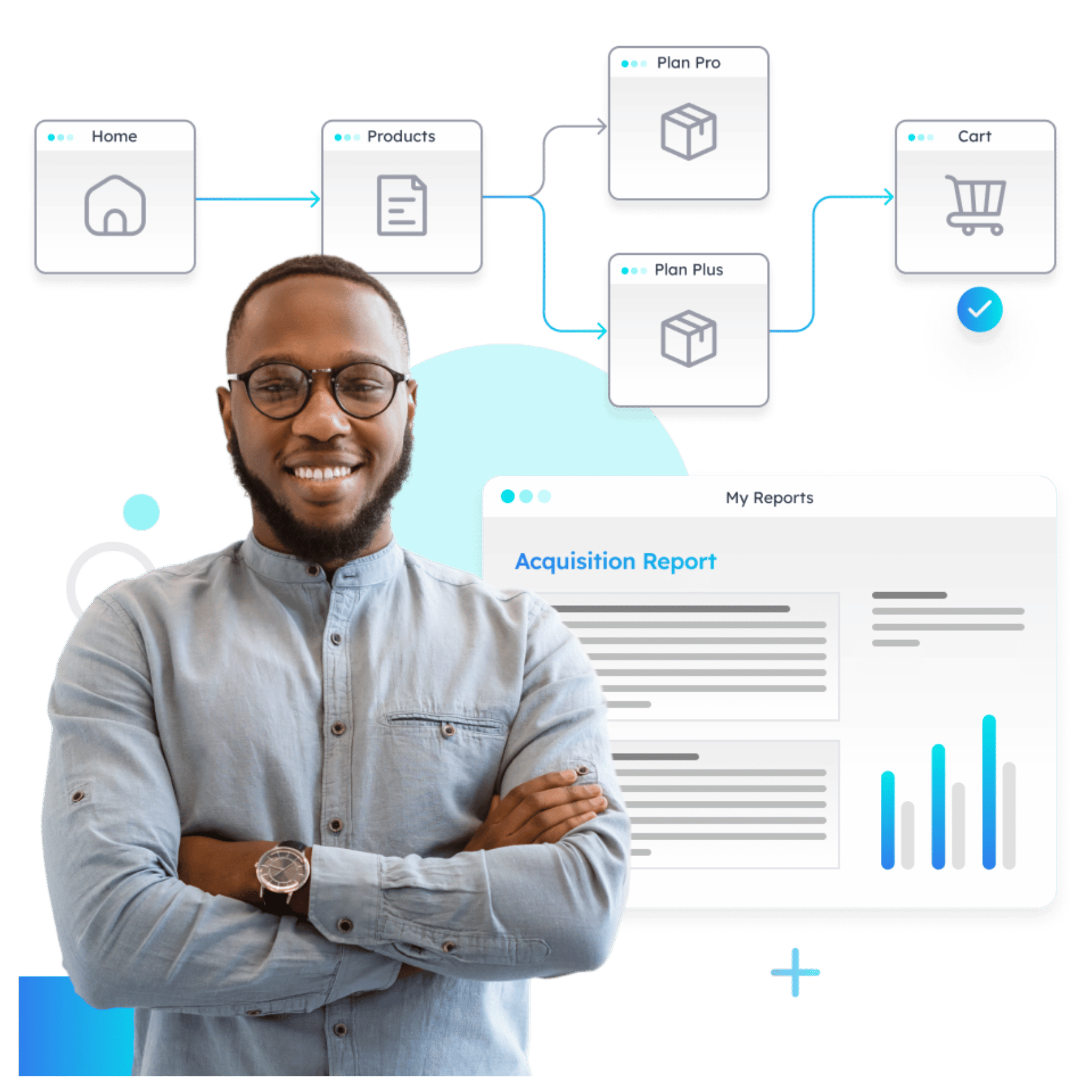In an era where data privacy regulations are constantly evolving, marketers face a challenging paradox: the need to extract relevant and trustworthy data from their website users while adhering to stringent privacy laws. As these regulations become increasingly complex, the tools we once relied on, such as Google Analytics, are struggling to keep up. But fear not, for there is a solution that not only meets these challenges head-on but also redefines the way we approach web analytics – Pathmonk Intelligence.
This technical blog post is your guide to navigating the shifting landscape of analytics data privacy and harnessing the power of Pathmonk Intelligence, a revolutionary cookieless analytics solution. We understand the pain points marketers experience when it comes to securing valuable insights from their website users, all the while maintaining full compliance with a web of privacy regulations like GDPR, CCPA, and others. Step by step we’ll show you how Pathmonk Intelligence can be your data privacy savior, enabling you to obtain the data you need while ensuring your practices align with the latest privacy standards.
Step by Step: Protecting Website Data Privacy with Pathmonk Intelligence
Protecting the privacy of your website users is paramount. Most analytics solutions, such as Google Analytics, use cookies to track user behavior, posing significant privacy concerns in the age of evolving data protection regulations. However, with Pathmonk Intelligence, you can safeguard user privacy while gaining valuable insights.
1. Set Up Your Pathmonk Intelligence Account
If you want a hands-on test of how Pathmonk Intelligence works and what it can do for you, sign up for a Free Demo. This hands-on experience will provide you with valuable insights into how Pathmonk Intelligence can work to your advantage.
Alternatively, you can directly start your journey with Pathmonk Intelligence by signing up for an account.
2. Onboarding and Installation
Once registered, the next step is to integrate Pathmonk Intelligence with your platform.
The onboarding process has been designed to be exceptionally user-friendly, making it a self-service experience that ensures you’re up and running smoothly.
3. Data Configuration
Your business is one-of-a-kind, and so are your objectives. We encourage you to customize your data collection settings to precisely align with your unique business goals. This level of customization empowers you to tailor your goals, ensuring that you receive the most relevant insights that will truly impact your success.
You have the flexibility to establish your goals using various methods: through a URL, a pixel that doesn’t rely on cookies, or by integrating with a third-party application. No matter which option you choose, you won’t need developers. However, if you encounter any issues with your data configuration, you can always contact our support team.
4. Start Optimizing Your Buying Journey
While other analytics tools will require you to take further actions, such as configuring the data retention period according to your privacy policy, anonymizing IP addresses, or setting data collection limits, with Pathmonk Intelligence you can forget about all that. Once you’re set, you’re free to start using your Intelligence account and get insights immediately without worrying about privacy issues.
Familiarize yourself with the platform and explore the different reports available.
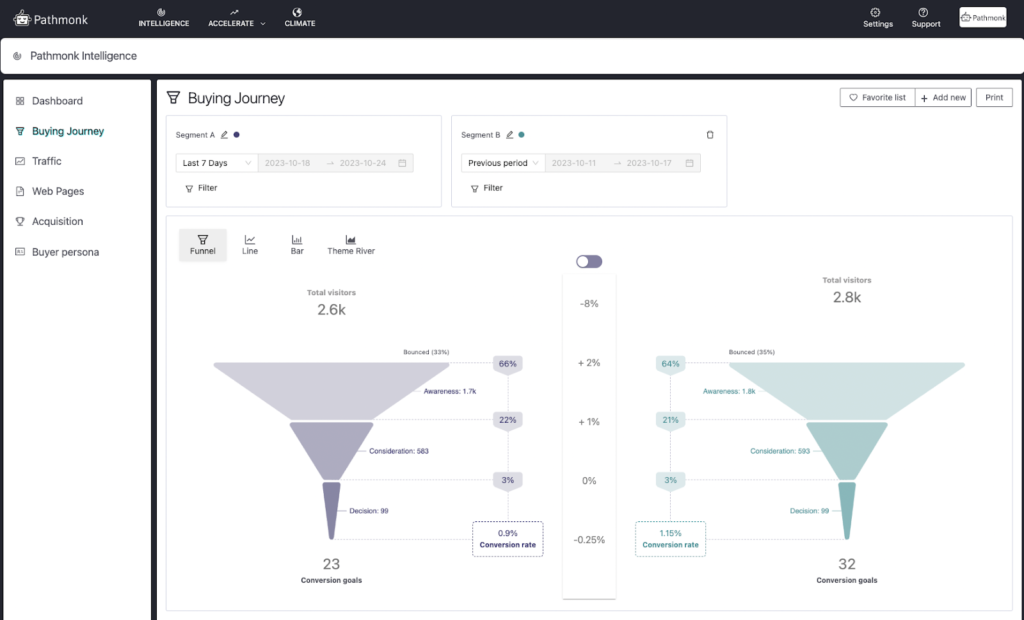
Within the Buying Journey Report, you’ll unearth the performance metrics of your buying journey stages. This report is instrumental in understanding how well users progress through your conversion funnel. By comprehending which stages of the buying journey are thriving and which require optimization, you can fine-tune your strategies for maximum impact. Whether it’s cart abandonment, product discovery, or final purchase, this report provides you with the insights you need.
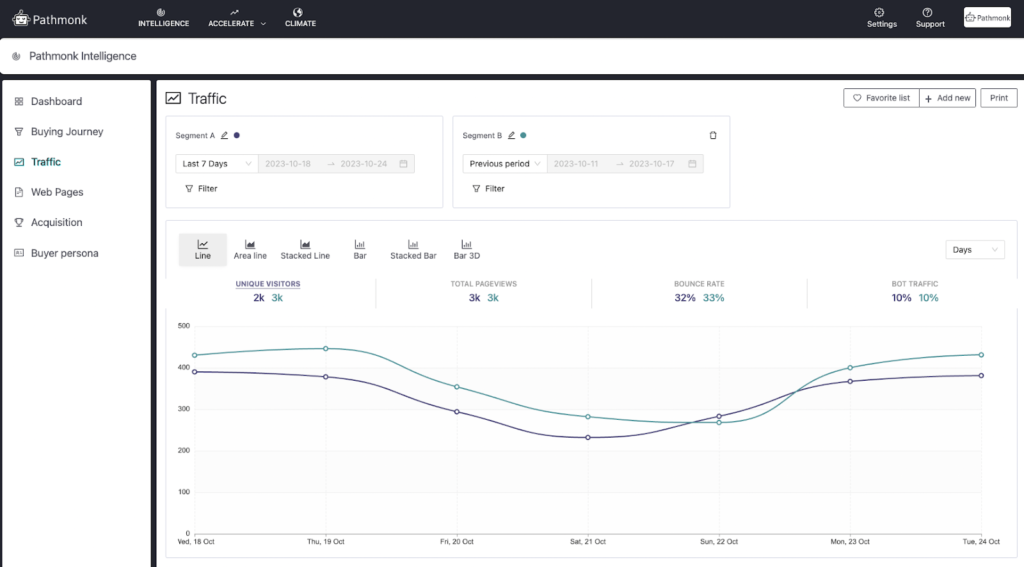
The Traffic Report offers a holistic analysis of your website’s visitors. It delves into the sources of your traffic, offering you a deeper understanding of where your users come from. This data can be a goldmine of information, helping you identify which marketing channels are the most effective and which may need improvement.
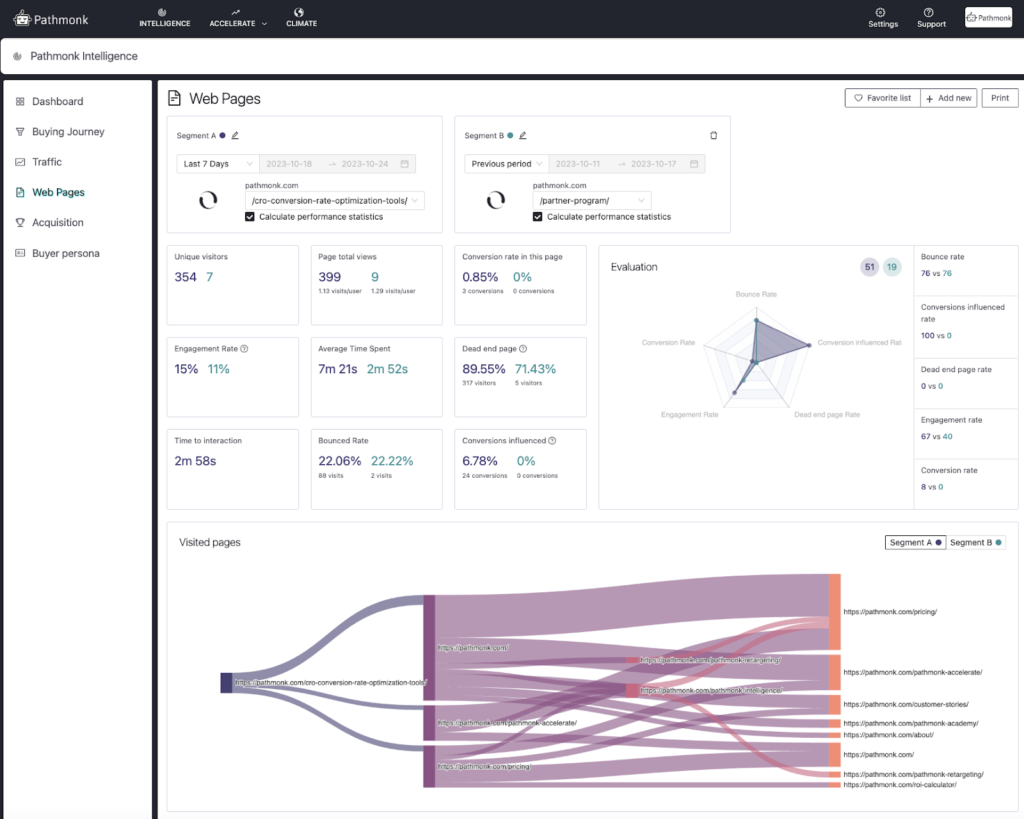
The Web Pages Report is your microscope for analyzing the performance of individual web pages within your site. It provides granular insights into the effectiveness of each page. This means you can identify high-performing content and areas that might need a facelift, optimizing for user engagement and conversion. Whether it’s your homepage, product pages, or blog posts, you’ll gain a detailed view of each page’s contribution to your website’s goals.
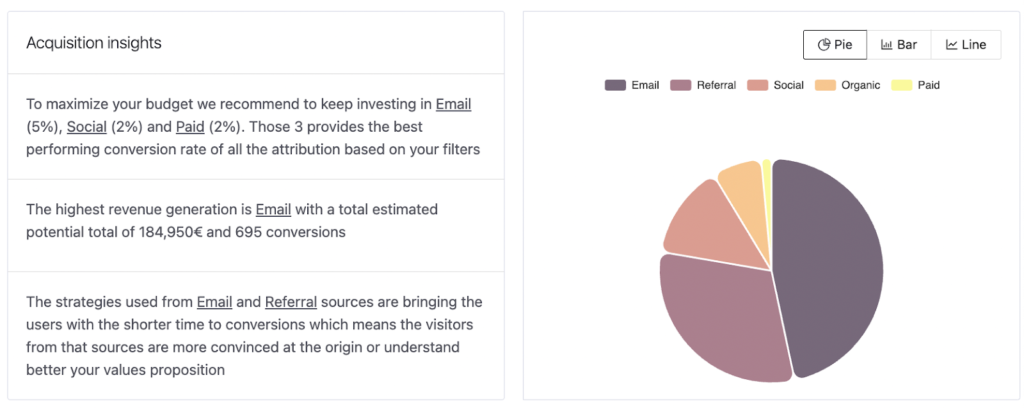
The Acquisition Report offers a window into the origins of your conversions. It’s not enough to know that conversions are happening; you need to understand where they are coming from. This report provides a roadmap, highlighting the sources that lead to successful conversions. It will also provide you with valuable actionable insights to enhance campaign performance and ROI.
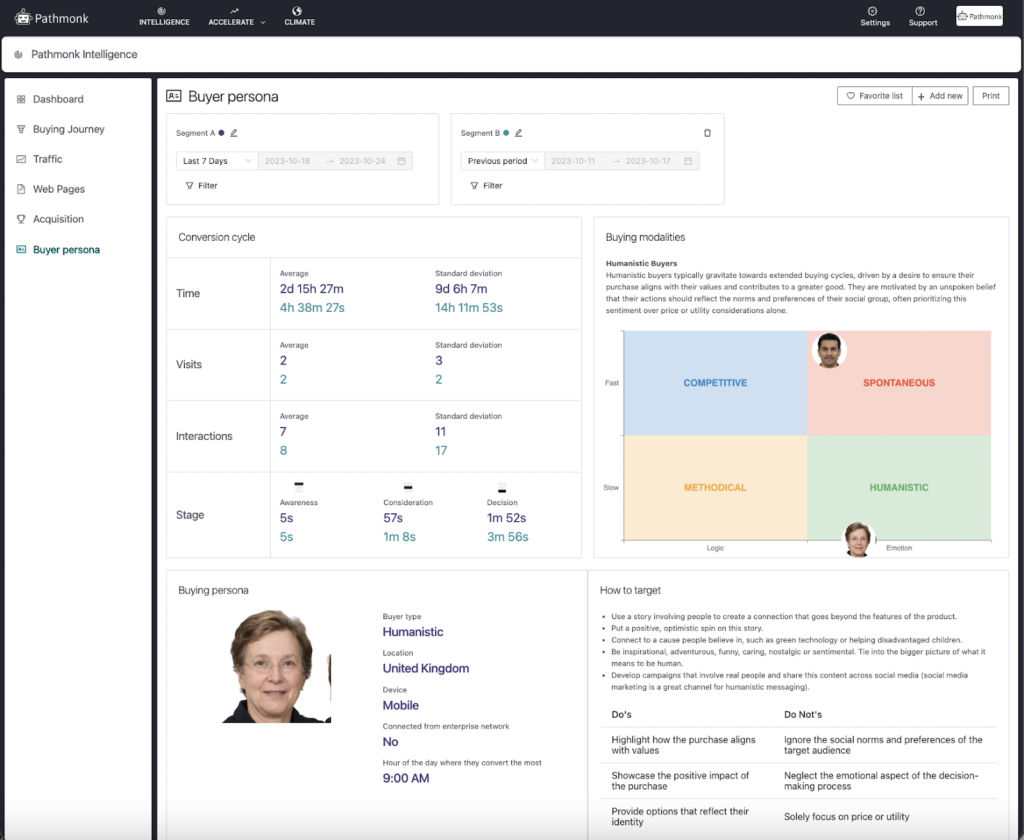
The Buyer Persona Report takes you on a deep dive into the peculiarities of your target audience. You’ll gain insights into the demographics, behaviors, and preferences of your audience. With this data in hand, you can refine your marketing strategies, ensuring that your messaging and campaigns resonate with your ideal customers. With it, you can get a closer look at your most valuable audience segments.
Understanding the Data Privacy Landscape
Privacy regulations, such as the General Data Protection Regulation (GDPR) in Europe and the California Consumer Privacy Act (CCPA), are setting new standards for data protection and user privacy. These regulations are designed to safeguard individuals’ personal information and give them more control over how their data is collected, processed, and used. They’re not just regional; they’re shaping global expectations for data privacy.
- GDPR, implemented in May 2018, has stringent requirements for businesses dealing with the data of European citizens. It mandates transparent data collection, informed consent, and the right for users to access and delete their data.
- CCPA, which came into effect in January 2020, grants California residents similar rights, including the right to know what personal information is collected and the right to opt out of the sale of their data.
The ramifications of these privacy regulations extend beyond legal compliance; they significantly impact the effectiveness of traditional analytics tools, such as Google Analytics, that rely on tracking cookies.
Implications of Non-Compliance and Potential Consequences for Marketers
Non-compliance with data privacy regulations can have far-reaching implications for marketers and businesses. Ignoring or failing to address these implications can lead to a host of negative consequences:
- Legal Consequences: Marketers and businesses that don’t adhere to data privacy regulations can face legal actions, including hefty fines. For instance, under GDPR, fines can go up to €20 million or 4% of the global annual revenue, whichever is higher. Non-compliance with CCPA can result in penalties of up to $7,500 per violation.
- Reputation Damage: Non-compliance can seriously damage a business’s reputation. A breach of trust in the eyes of customers and the public can lead to loss of credibility, customer churn, and negative publicity that’s challenging to overcome.
- Loss of Customer Trust: Customers are increasingly privacy-conscious and concerned about the safety of their data. Non-compliance erodes trust, and customers may abandon businesses that they perceive as not taking their privacy seriously.
- Data Breaches: Poor data privacy practices may lead to data breaches, which can be costly to mitigate. Moreover, data breaches expose both businesses and their customers to risks such as identity theft and financial loss.
- Ineffective Marketing: Traditional marketing strategies that rely on extensive user data may become less effective if privacy regulations limit the data that can be collected and used. Marketers may struggle to reach the right audience and create personalized experiences.
The Limitations of Traditional Analytics Tools in Ensuring Compliance
Traditional analytics tools, including Google Analytics, come with inherent limitations in ensuring compliance with evolving data privacy regulations:
- Cookie Reliance: Many traditional tools heavily rely on tracking cookies for user identification and behavior analysis. This cookie-centric approach can be seen as invasive and may require explicit user consent, complicating the user experience.
- Data Retention: Traditional tools may not offer the flexibility to manage data retention periods effectively, making it challenging to comply with regulations that require data to be deleted after a certain period.
- Limited Anonymization: Traditional tools might not have robust mechanisms for anonymizing user data effectively, leaving sensitive information vulnerable to exposure.
- Complex Consent Management: Meeting consent requirements under GDPR, CCPA, or similar regulations can be complex and resource-intensive with traditional tools. Managing user consent preferences and ensuring they are honored can be challenging.
- Risk of Data Breaches: Traditional tools often store large amounts of user data, making them potential targets for data breaches. Storing sensitive user data poses a considerable risk to compliance.
In a world where data privacy regulations are constantly evolving and user privacy is a top concern, the limitations of traditional analytics tools can result in non-compliance and its associated consequences.
This is precisely where a cookieless solution like Pathmonk Intelligence comes into play.
Pathmonk Intelligence: The Solution for Analytics’ Data Privacy Challenges
Pathmonk Intelligence is a cookieless solution that empowers you to gather invaluable insights from website users while respecting their data privacy and adhering to stringent privacy regulations. Unlike traditional analytics platforms that rely on tracking cookies, Pathmonk Intelligence takes a fundamentally different approach, ensuring data privacy and transparency are at the forefront of its design.
Pathmonk Intelligence’s key features include:
- Privacy-Friendly Data Collection: Pathmonk Intelligence doesn’t depend on tracking cookies, making it an ideal choice for data privacy-conscious businesses. Users can trust that their behavioral data is secure.
- Anonymous User Profiles: Pathmonk Intelligence creates anonymous user profiles, focusing on behavior patterns and actions rather than individual user identification. This shift in approach ensures privacy-friendly data collection.
- Granular User Insights: Pathmonk Intelligence provides in-depth user behavior insights, enabling marketers to understand user journeys, preferences, and interactions with your website.
- Customizable Reports: You can access a variety of reports, including Buying Journey, Traffic, Web Pages, Acquisition, and Buyer Persona reports. These reports offer a holistic view of your website performance, user behavior, and customer segments.
In essence, Pathmonk Intelligence doesn’t just solve data privacy challenges; it empowers you to leverage data responsibly while respecting the privacy and rights of your website users. It’s a paradigm shift that redefines the way we think about website analytics in an era where privacy-conscious practices are paramount.
Applying Pathmonk Intelligence Privacy-Friendly Web Analytics to Your Marketing Strategy
Now that we’ve explored how Pathmonk Intelligence is designed to tackle data privacy challenges, it’s time to understand how to put this privacy-friendly web analytics solution to work within your marketing strategy.
Here, we’ll outline what you, as a marketer, should do with the outcomes derived from using Pathmonk Intelligence.
1. Monitoring and Compliance:
Regularly review the data collected by Pathmonk Intelligence to ensure that your marketing practices remain in compliance with data privacy regulations.
Monitor for any potential issues or changes in privacy laws that may affect your strategy, and make adjustments accordingly.
2. Communication and Transparency:
Be transparent with your audience about data collection. Let your website users know that their behavioral data is safe with your cookieless analytics. Assure them that their privacy is a top priority, and explain how Pathmonk Intelligence respects their rights.
3. Identify Valuable User Insights:
Start by diving into the data provided by Pathmonk Intelligence. You’ll gain insights into user behavior, preferences, and engagement patterns.
Look for trends and patterns that can inform your marketing strategies. For example, you might discover which content resonates most with your audience or the channels that drive the most conversions.
4. Segment Your Audience:
Leverage the segmentation capabilities of Pathmonk Intelligence to divide your audience into meaningful groups. Segmenting your audience based on factors like demographics, behavior, or preferences allows you to tailor your marketing messages and campaigns for maximum impact.
5. Personalize Your Marketing Efforts:
Leverage the detailed user insights provided by Pathmonk Intelligence to create highly personalized marketing campaigns. Personalization can significantly enhance user engagement, as it demonstrates that you understand and cater to individual needs and preferences.
6. Optimize User Journeys:
Analyze the user journeys on your website to identify potential bottlenecks or points of friction. With this data, you can make data-driven improvements to the user experience, guiding visitors toward desired actions more effectively.
Incorporating Pathmonk Intelligence into your marketing strategy is not just about collecting data; it’s about using that data to create more meaningful and privacy-friendly experiences for your users. By following these steps and making data-driven decisions, you can stay ahead of the curve in the privacy-conscious digital world while achieving your marketing objectives effectively and ethically.
Exploring Pathmonk Intelligence Privacy-Friendly Website Data Use Cases
Pathmonk Intelligence’s cookieless website analytics isn’t a one-size-fits-all solution; it offers a range of applications tailored to various industries. Let’s delve into how different industries can benefit from this innovative approach, solving specific challenges along the way:
eCommerce:
eCommerce companies can benefit from Pathmonk Intelligence by gaining privacy-conscious insights into user behavior. They can track user journeys, optimize the sales funnel, and enhance personalized shopping experiences, all while adhering to stringent data privacy regulations like GDPR and CCPA.
Healthcare:
In the healthcare sector, patient privacy is paramount. Pathmonk Intelligence helps healthcare organizations understand website user behavior without jeopardizing patient confidentiality. They can improve patient engagement, facilitate secure information access, and ensure compliance with Health Insurance Portability and Accountability Act (HIPAA) regulations.
Financial Services:
Financial institutions can use Pathmonk Intelligence to maintain strict user privacy and regulatory compliance. By analyzing user behavior without relying on cookies, they can enhance the online banking experience, detect fraud, and stay aligned with financial industry-specific regulations.
Travel and Hospitality:
The travel and hospitality industry can leverage Pathmonk Intelligence to create personalized guest experiences while safeguarding customer data. By understanding user behavior and preferences, they can enhance booking processes and comply with data privacy laws applicable to the travel sector.
Government and Nonprofits:
Government agencies and nonprofits can ensure transparency and data privacy compliance while providing services online. Pathmonk Intelligence allows them to track user engagement, optimize their online platforms, and maintain public trust, all within the framework of public sector-specific regulations.
Understand how your prospects behave (in real time)
- Visualize how visitors move across your website
- Identify drop-offs and friction points instantly
- Turn journey data into actionable insights with AI
